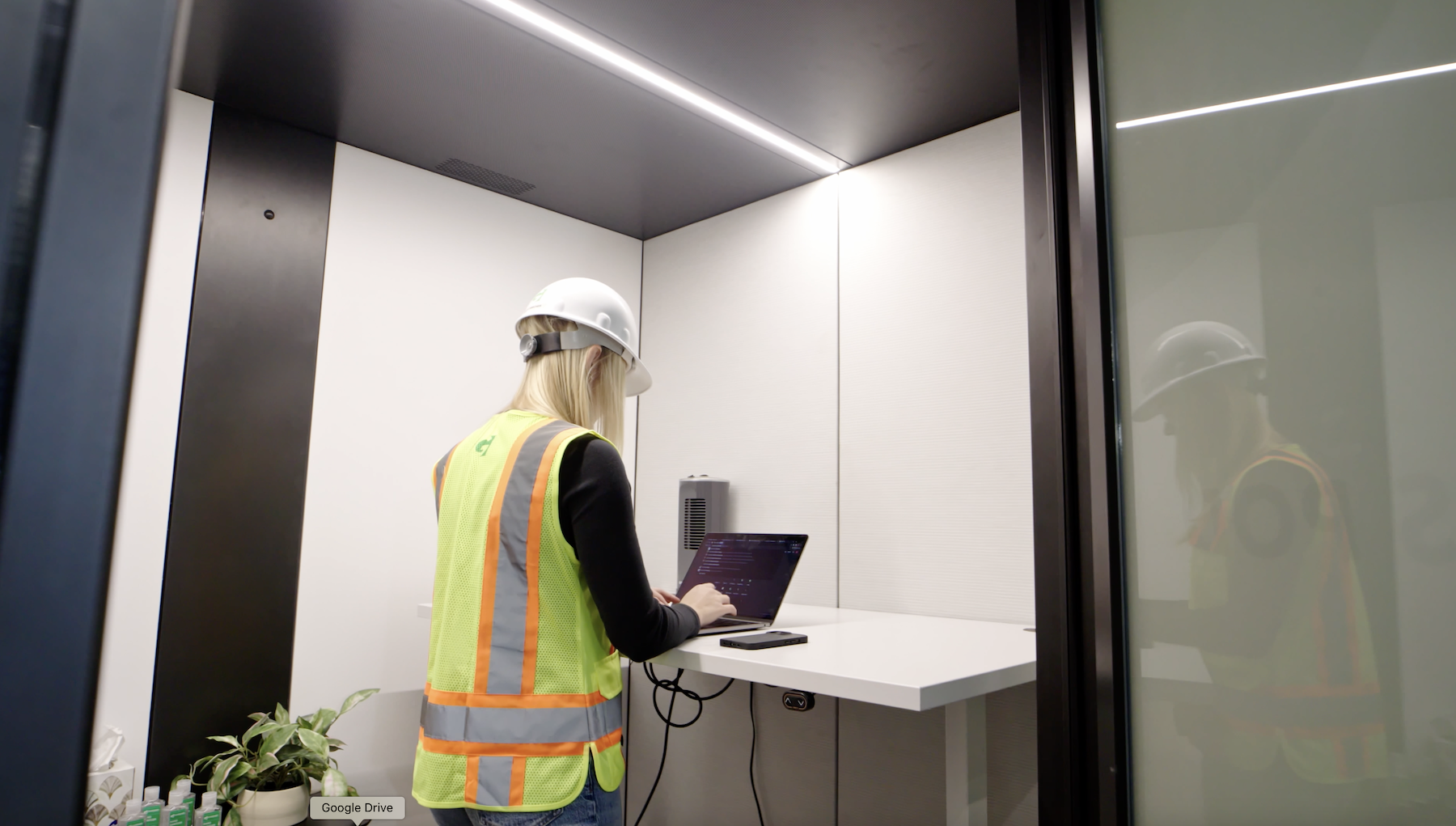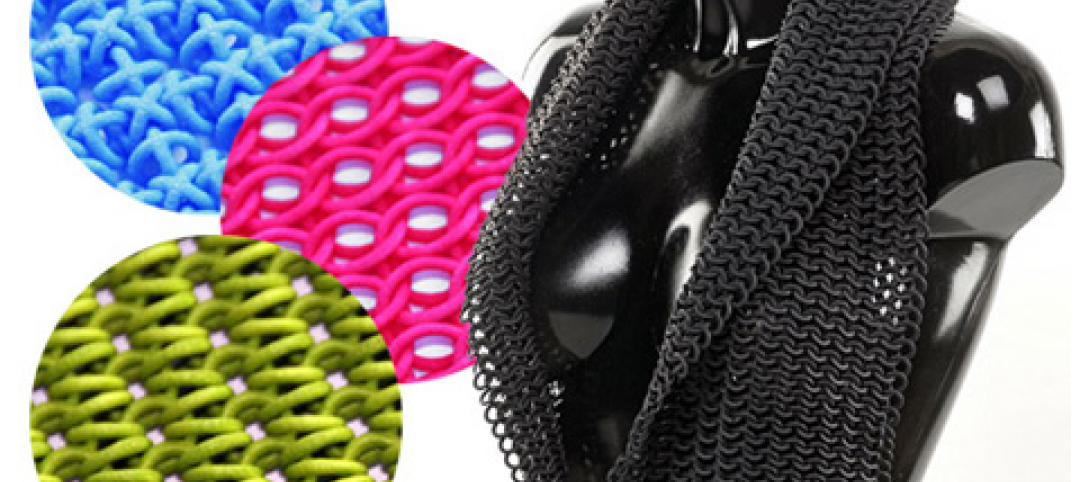The mental health of workers has emerged as an urgent topic within the construction industry, with firms considering the issue as part of their employee wellness initiatives.
One such firm is Minneapolis-based general contractor Gardner Builders. Three of its jobsites currently include Wellness Pods, 6x8-ft steel boxes that provide workers with a temporary, anxiety free sanctuary for private activities. The heated and cooled pods are wheelchair-accessible, with a mini fridge, desk and chair, and rug.
The concept for the pods dates back to last year, when Gardner Builders noticed that its employees engaged in activities that might be best served by having a private space to retire to. This need was expressed further during a meeting of the company’s internal Pulse group, which discusses employee concerns. A 20-year-old female laborer pointed out that she had nowhere to go while at work to pump breastmilk. “The idea for the wellness pod was borne from this,” says Jessica Stoe, Gardner Builders’ Brand, Wellness, and Marketing Director, and Wellness Pod Lead.
The first pods, built in May 2022, were small plywood boxes within Gardner’s offices. Stoe says the goal, then and now, was to create a place that is soundproof, comfortable, and accessible for everything from meditation, telehealth, privacy, and prayer. Based on worker feedback, most employees seem to be using the pods for private calls.
Future pods will be mobile

The pod is more of a concept than a static structure; some are on wheels, for example. Gardner has also partnered with the furniture supplier Teknion to develop its steel pod with a glass door. Stoe estimates that a plywood pod costs Gardner $3,000; the steel model runs between $12,000 and $16,000.
Right now, a jobsite’s foreman or superintendent handles the scheduling for using jobsite pods. Stoe says Gardner is looking into scheduling software similar to what office workers use to book meeting rooms.
Future iterations of the pods, says Stoe, are likely to be more mobile so they can be moved around a jobsite as needed. And Gardner is developing a ground-up, climate-controlled model for exterior use. That model, says Stoe, would have an iPad mounted to it that allows workers to schedule the pod themselves.
Gardner Builders has gotten inquiries about its Wellness Pods from the local YMCA and Chamber of Commerce, and wants to share the concept with other contracting firms.
Related Stories
| Nov 9, 2010
12 incredible objects being made with 3D printers today
BD+C has reported on how 3D printers are attracting the attention of AEC firms. Now you can see how other creative types are utilizing this fascinating printing technology. Among the printed items: King Tut’s remains, designer shoes, and the world’s smallest Rubik’s Cube.
| Nov 9, 2010
U.S. Army steps up requirements for greening building
Cool roofs, solar water heating, and advanced metering are among energy-efficiency elements that will have to be used in new permanent Army buildings in the U.S. and abroad starting in FY 2013. Designs for new construction and major renovations will incorporate sustainable design and development principles contained in ASHRAE 189.1.
| Nov 9, 2010
Designing a library? Don’t focus on books
How do you design a library when print books are no longer its core business? Turn them into massive study halls. That’s what designers did at the University of Amsterdam, where they transformed the existing 27,000-sf library into a study center—without any visible books. About 2,000 students visit the facility daily and encounter workspaces instead of stacks.
| Nov 9, 2010
Turner Construction report: Green buildings still on the agenda
Green buildings continue to be on the agenda for real estate owners, developers, and corporate owner-occupants, according to the Turner 2010 Green Building Market Barometer. Key findings: Almost 90% of respondents said it was extremely or very likely they would incorporate energy-efficiency improvements in their new construction or renovation project, and 60% expected to incorporate improvements to water efficiency, indoor environmental quality, and green materials.
| Nov 5, 2010
New Millennium’s Gary Heasley on BIM, LEED, and the nonresidential market
Gary Heasley, president of New Millennium Building Systems, Fort Wayne, Ind., and EVP of its parent company, Steel Dynamics, Inc., tells BD+C’s Robert Cassidy about the Steel Joist Manufacturer’s westward expansion, its push to create BIM tools for its products, LEED, and the outlook for the nonresidential construction market.
| Nov 3, 2010
First of three green labs opens at Iowa State University
Designed by ZGF Architects, in association with OPN Architects, the Biorenewable Research Laboratory on the Ames campus of Iowa State University is the first of three projects completed as part of the school’s Biorenewables Complex. The 71,800-sf LEED Gold project is one of three wings that will make up the 210,000-sf complex.
| Nov 3, 2010
Park’s green education center a lesson in sustainability
The new Cantigny Outdoor Education Center, located within the 500-acre Cantigny Park in Wheaton, Ill., earned LEED Silver. Designed by DLA Architects, the 3,100-sf multipurpose center will serve patrons of the park’s golf courses, museums, and display garden, one of the largest such gardens in the Midwest.
| Nov 3, 2010
Public works complex gets eco-friendly addition
The renovation and expansion of the public works operations facility in Wilmette, Ill., including a 5,000-sf addition that houses administrative and engineering offices, locker rooms, and a lunch room/meeting room, is seeking LEED Gold certification.
| Nov 3, 2010
Sailing center sets course for energy efficiency, sustainability
The Milwaukee (Wis.) Community Sailing Center’s new facility on Lake Michigan counts a geothermal heating and cooling system among its sustainable features. The facility was designed for the nonprofit instructional sailing organization with energy efficiency and low operating costs in mind.
| Nov 3, 2010
Seattle University’s expanded library trying for LEED Gold
Pfeiffer Partners Architects, in collaboration with Mithun Architects, programmed, planned, and designed the $55 million renovation and expansion of Lemieux Library and McGoldrick Learning Commons at Seattle University. The LEED-Gold-designed facility’s green features include daylighting, sustainable and recycled materials, and a rain garden.















